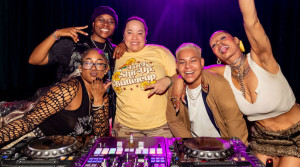In one of the few Canadian studies available, Black women had a preterm birth rate of 8.9%—substantially higher than the 5.9% rate for white women. Preterm birth is a key warning sign, often linked to higher rates of maternal morbidity and mortality. Yet, Canada does not routinely collect or publish race-based statistics on maternal deaths, leaving the true scale of the problem shrouded in silence. The actual number of deaths is likely grossly underestimated.
Frontline experts and Black healthcare providers point to patterns in the U.S. and U.K., where Black women are three to four times more likely to die from pregnancy or childbirth than their white peers.
The disparities are real, the data is scarce, and the consequences are devastating. So, why are Black women in Canada still forced to navigate a healthcare system that too often fails to see, hear, or protect them, and what will it take to finally turn the tide?
That question echoed all week during Toronto's first-ever Black Maternal Health Week (TBMHW), where healthcare leaders gathered to confront uncomfortable truths about racial disparities in maternal care.
Jenelle Ambrose Dash, a lawyer and maternal health advocate, started the Black Maternal Health Collective Canada (BMHCC) after a devastating personal loss.
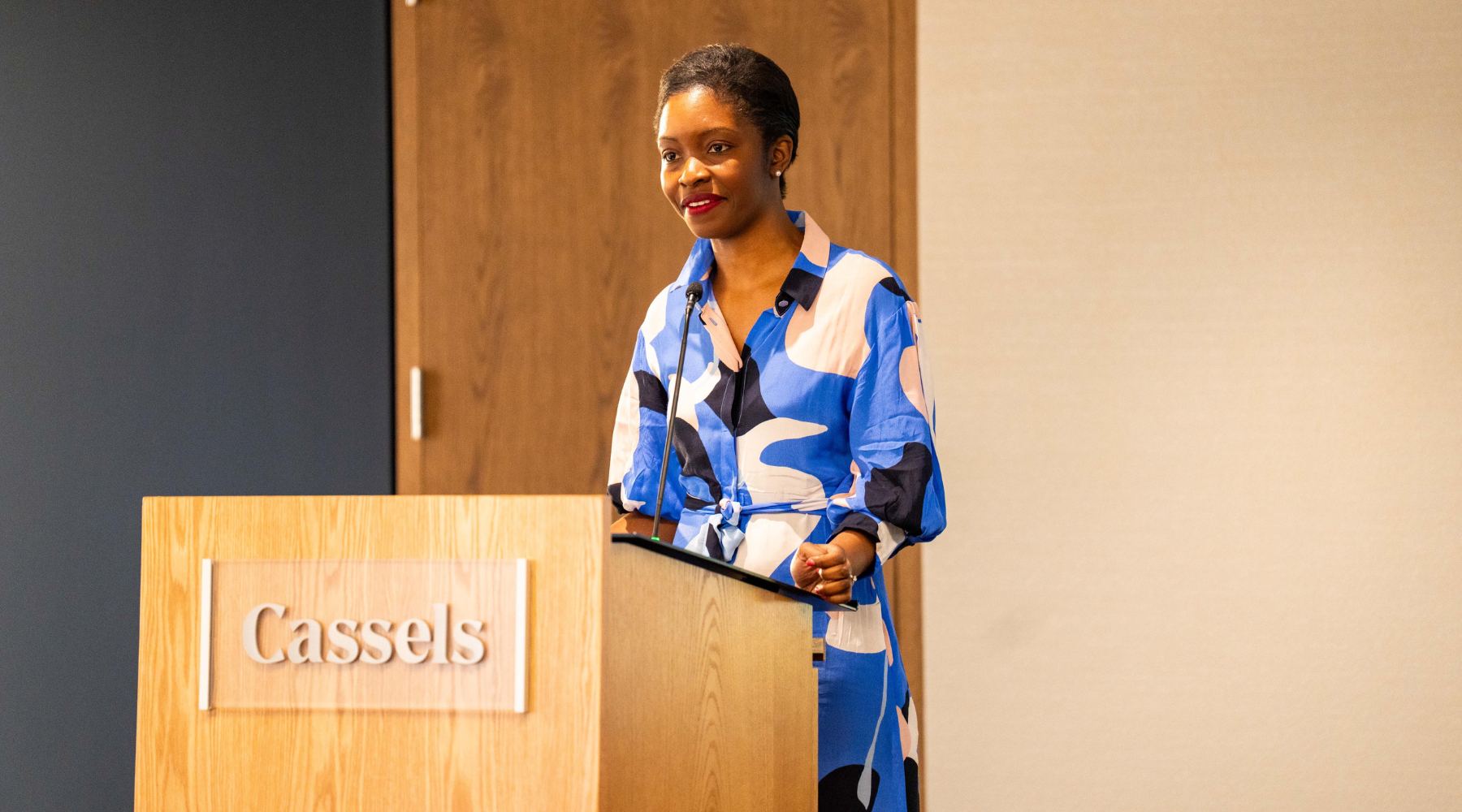 Jenelle Ambrose-Dash, founder of the Black Maternal Health Collective Canada (BMHCC)
Jenelle Ambrose-Dash, founder of the Black Maternal Health Collective Canada (BMHCC)
In 2023, she developed pre-eclampsia—a life-threatening pregnancy complication—and lost her daughter at seven months. Despite repeated concerns, her symptoms went unrecognized until it was too late, a tragedy she attributes to gaps in culturally competent care.
In 2024, she launched the BMHCC, and six months later, the City of Toronto officially declared The Toronto Black Maternal Health Week for April 11–17, 2025. This first-of-its-kind, week-long event which ByBlacks attended, featured expert-led seminars, interactive workshops, and community discussions, all focused on addressing the physical, emotional, and mental well-being of Black mothers during pregnancy and postpartum.
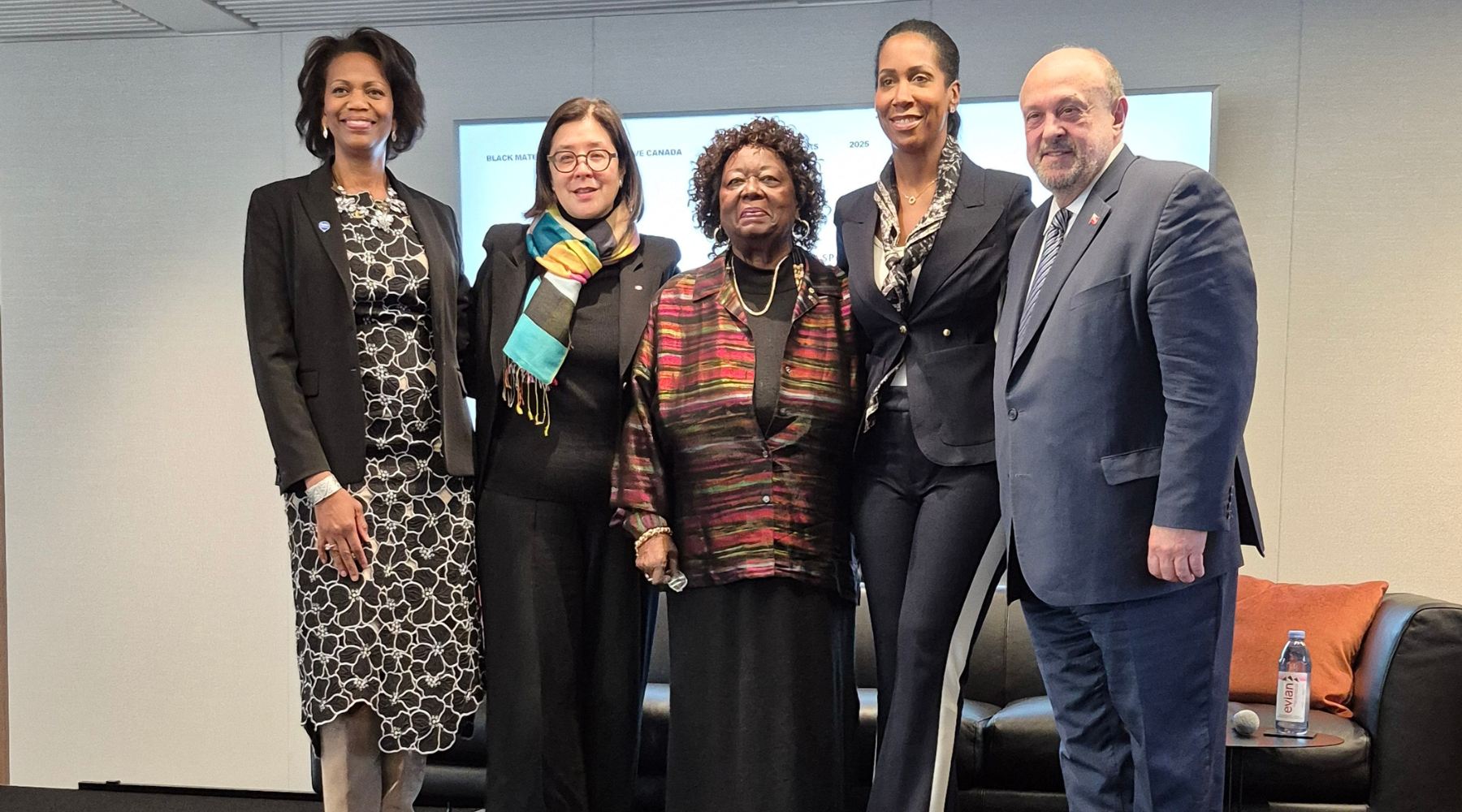 The Fireside Chat at Toronto Black Maternal Health Week L-R: Jennifer Bernard, Dr. Eileen de Villa, Jean Augustine, CBE, Dr. Marjorie Dixon, MPP Michael Tibollo.
The Fireside Chat at Toronto Black Maternal Health Week L-R: Jennifer Bernard, Dr. Eileen de Villa, Jean Augustine, CBE, Dr. Marjorie Dixon, MPP Michael Tibollo.
"We have a huge problem with the quality of care for Black women and families," says Dr. Marjorie Dixon, founder, CEO, and Medical Director of Anova Fertility, during a revealing fireside chat with Jennifer Bernard, President and CEO of SickKids Foundation. “Regardless of income or education, being both a woman and Black puts you at a disadvantage.”
 Cheyenne Scarlett with her husband and 5 children
Cheyenne Scarlett with her husband and 5 children
Cheyenne Scarlett is a mother of 5. She’s a professor at Seneca Polytechnic, a certified childbirth educator and doula. For her, this work is personal. “One of the worst experiences I had was with an ectopic pregnancy. At first, I thought it was a miscarriage, which I’d had before.” When Scarlett went to a local clinic for an ultrasound, no doctor was on site to speak with her. Instead, a doctor talked to her by phone. “I didn’t know this doctor at all, but he said that I was experiencing an ectopic pregnancy, which was very dangerous. He said I should go to the ER immediately. His exact words were ‘I’ve seen people bleed out and die from this.”
Cheyenne went to her local hospital, armed with the ultrasound and the urgent advice from the doctor. But she was surprised to find there was no urgency at all. “The ER doctor looked at the medical report and said, ‘You look fine, you don’t seem to be in any pain. I’m not buying what they’re selling.”
Scarlett was sent home to ‘wait it out’ and to return in the morning. When she returned the next day for more tests, she was now bleeding internally, and it was too late to be treated with medication. She needed surgery. And she needed it now. During surgery, doctors removed one of Scarlett’s fallopian tubes, saying they couldn’t save it because the embryo was too deeply embedded.
“My life was not valued,” says Scarlett. “I can’t help but think about how urgent that first doctor sounded on the phone, without seeing me, without knowing my race. Maybe he assumed I was white. And then compare that to going in person and them being so nonchalant.”
The barriers are everywhere—systemic, interpersonal, and internalized. Black women routinely encounter healthcare environments where no one looks like them, where cultural understanding is absent, and where dangerous myths, like Black people having higher pain tolerance, still influence care decisions. The result? Delayed diagnoses, inadequate pain management, and a lack of trust that keeps Black women from seeking care until it’s too late.
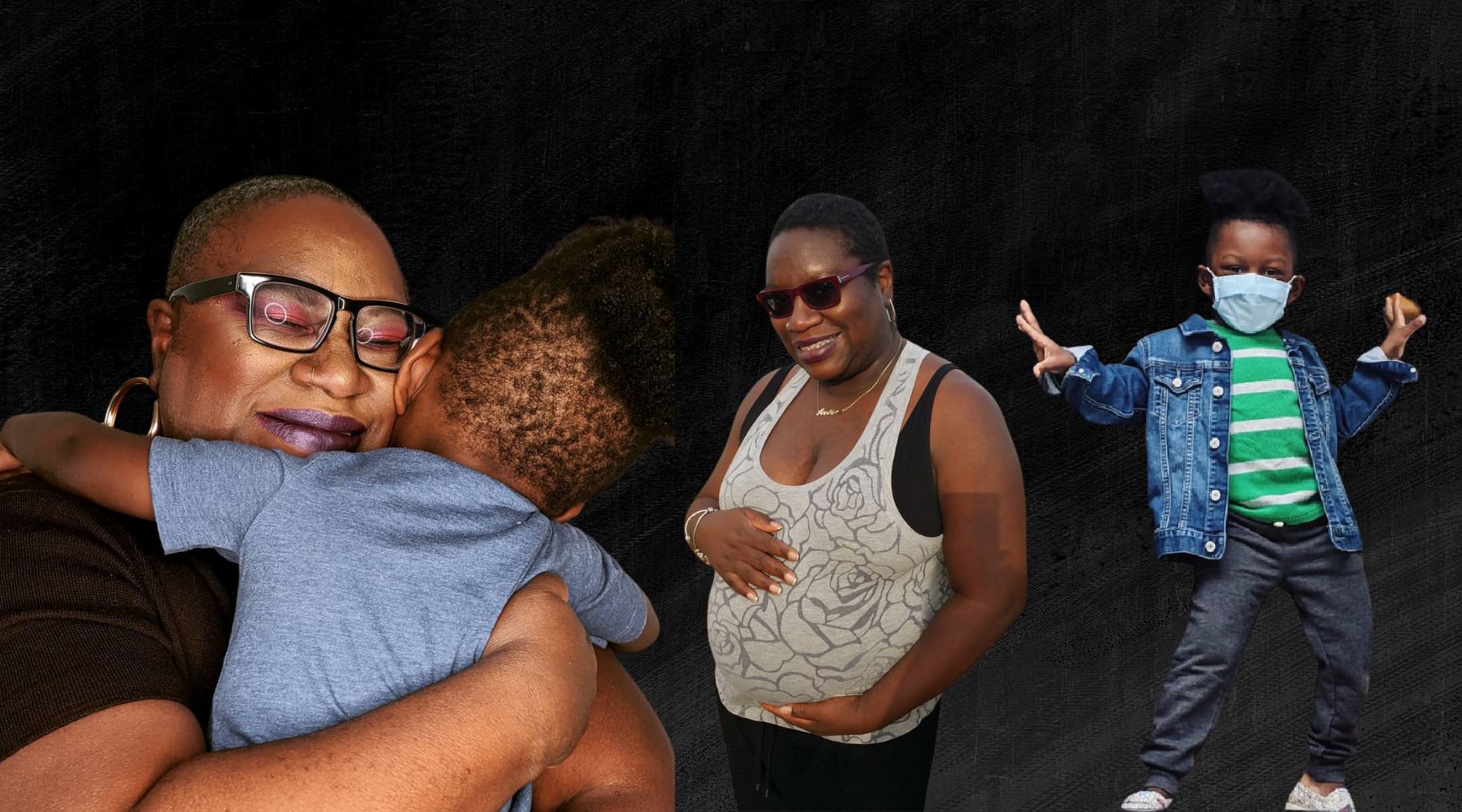 Ann Marie Collymore
Ann Marie Collymore
Ann Marie Collymore, an entertainment and culture critic from Toronto, says she had an easy pregnancy. “Everything was great. I had no issues, and I was healthy throughout. The only risk factor was my age at 42 and that my mom had preeclampsia back when she gave birth to my brother, also at 42,” says Collymore.
Collymore says the days after her C-section were fuzzy. She remembers her sister having to wake her up to see the baby, and then things just got worse from there. “I got up to use the bathroom, and I was dizzy. My head hit the floor, and I was in and out of consciousness for about 5 days.”
When Collymore’s mom noticed her daughter was not speaking coherently, could barely stay awake, and that her tongue was hanging out of her mouth, she knew something was wrong. “The doctor on call would not even respond to my mom. She actually had to run after him in the hallway and convince him to run tests,” says Collymore.
It turns out Collymore’s vitals were slipping. Her kidneys were malfunctioning, and her blood pressure was extremely high in a state of hypertensive crisis. It took 3 days of tests and treatment before Collymore regained full consciousness and was diagnosed with HELLP syndrome, a life-threatening pregnancy complication which is a form of post-eclampsia. Catching this early is critical because serious illness like stroke, organ damage and even death happens in about 25% of the cases.
“If it weren’t for my mom, I wouldn’t be here today. It seems like, whenever Black women speak up, the response is often ‘oh they’re okay, they can handle it’. No, we are distressed, why do we have to prove that we’re actually in pain?” says Collymore.
One of the most significant barriers to addressing Black maternal health disparities in Canada is the shocking lack of comprehensive data.
“What gets researched gets changed,” says Bernard, the first Black woman to lead the SickKids Foundation, known for her inclusive vision and commitment to diversity. “You cannot base policy on anecdotal evidence or hearsay, no matter how compelling and truthful you know they are,” she says. Yet, for decades, Black maternal health has been invisible in the numbers that drive funding and reform.
According to Bernard, research on Black maternal health in Canada is largely fragmented and relatively new.
“A lot of it is about three or four years old and not always consistent across the country,” she says, noting that most comprehensive research initiatives only began during the COVID-19 pandemic—which itself was “a public health emergency for Black people.”
Each province has different data collection regulations, so advocates are asking for a national strategy.
Scarlett points out that much of this advocacy focuses on Black maternal mortality rates, but she feels that needs to change too. “What about maternal casualties? We need research in this area. Because the bar shouldn't be to just “survive” childbirth. We should be whole. Being alive and being whole are not the same,” says Scarlett.
Bernard, who shared how both her stepdaughters were presumed to be single mothers during pregnancy checkups and steered toward food programs, says cultural sensitivity training, while increasingly common, often falls short.
“You can do it in medical school and tick that box, but unless it's an ongoing requirement, people are going to fall back on their old biases. The whole system has to require it. It has to be ongoing education.”
Those old biases can lead to devastating consequences, many of which Janice Appiah highlighted as a guest speaker at the Toronto Black Maternal Health Week.
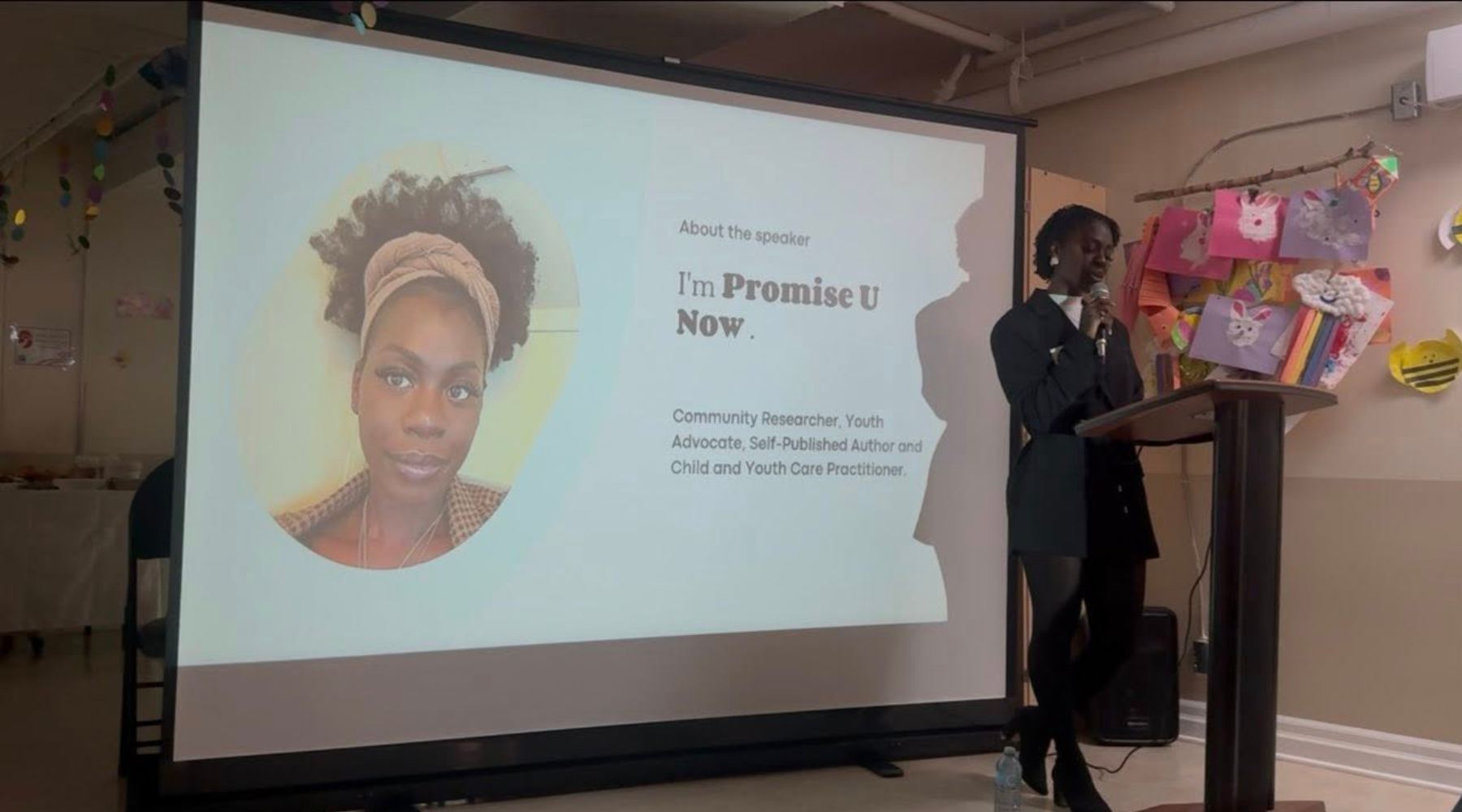 Janice Appiah presenting at Toronto Black Maternal Health Week
Janice Appiah presenting at Toronto Black Maternal Health Week
Appiah (who also goes by Promise) was 19 years old when she delivered her first child at a hospital in Brampton, Ontario. She went for a routine check-up 3 weeks before the due date and was told the baby was in a feet-first position. The doctor told Appiah she would need a C-section that same day.
“I was in shock because I knew I still had 3 more weeks to go in the pregnancy and that may have been enough time for the baby to turn. But I didn’t really know my rights, so I went along with it,” says Appiah.
Appiah says she wanted a natural childbirth and felt she was robbed of that and coerced into a C-section. Things got worse once she went home with her baby. “Two midwives came to visit me at home, and they weighed the baby and said she had lost some weight and that I needed to give her formula. I declined. My daughter had no problem latching, and breastfeeding was going well. They told me that if I didn’t have formula in the house by tomorrow, then they would report me to Child Protective Services. So I bought the formula, but I didn’t give it to my daughter, I continued to breastfeed. When they returned the next day, my daughter had put on quite a few ounces. And the midwife said, ‘see it’s good that you gave her the formula.’ I just nodded and didn’t say anything else,” says Appiah. “I was just scared that they would take my child away. They spoke to me like they did not believe I could take care of my baby.”
Both Bernard and Dixon are clear: piecemeal efforts and one-off training won’t cut it. But this will:
- Mandatory, ongoing cultural competency and trauma-informed care training for all healthcare providers.
- Greater representation of Black professionals at every level of the system.
- Community-driven research and data collection, with Black women leading the way.
- Coordinated, collective action among Black health organizations to amplify impact and avoid duplication.
- Visible signals of welcome and inclusion in healthcare spaces—from art to staff diversity to language access.
- Designated days like mammogram weekends for Black women with culturally sensitive care.
Many of the negative maternal care experiences are shared across racial lines. “If you solve for the Black community, you solve for everyone,” says Bernard. “Because everyone, in a way, other than the Indigenous community, is less complex. So, it adds value when you solve for the Black community, because every single community benefits.”
There are other groups, such as the Black Health Equity Working Group, made up of Black health sector leaders and health equity experts. The group formed during the pandemic and is working to develop a governance framework for health data collected from Black communities in Ontario.
Dixon emphasizes the need for a collective approach: “We have to coordinate really well, so we're not re-doing our efforts over and over or duplicating efforts. I think that's where the Black Maternal Health Collective comes in. We need to sit down at the table and say who's the best to do each part.”
For individuals navigating the healthcare system today, Bernard offers practical advice:
“First of all, you are entitled to ask for more than a 15-minute appointment. You can bring a doula. You can bring someone with you that can advocate...You can ask for your health records if you're not happy with your doctor and move to someone who actually wants to take care of you. You are not their hostage.”
As the first TBMHW marks its place in history, Ambrose Dash's closing words resonate as both a challenge and invitation: “In these strange times that we're living in, I'm reminded of one of Dr. Martin Luther King's famous quotes: ‘In the end, we will remember not the words of our enemies but the silence of our friends.’ And I want to thank all of you for choosing not to be silent.”
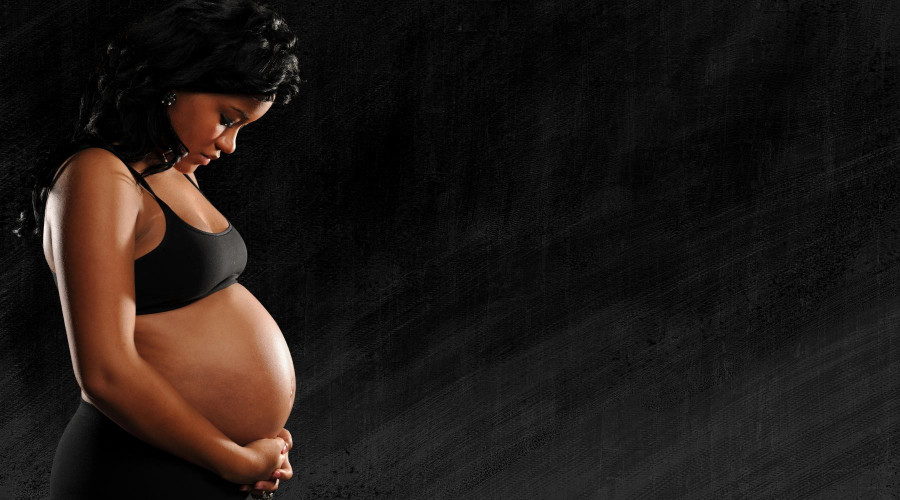
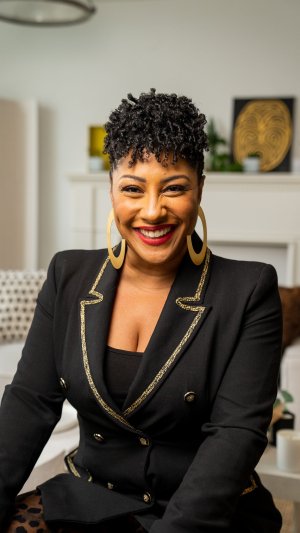 By
By 


